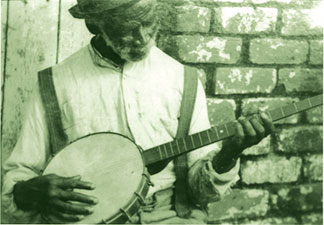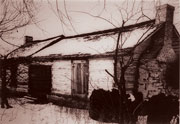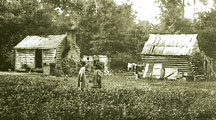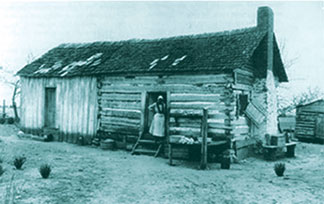

I Was A Slave: Plantation Life
© Enhanced Photo: IWASASLAVE.com
Compiled by Donna Wyant Howell
(The last of a Four Part Series)
In the 1930s, thousands of formerly enslaved African-American elders dictated their full life stories during interviews conducted by the US government. The following is the translation of their words from southern dialect into standardized English. Their original words are published in “I WAS A SLAVE,” a series of books.
It is very important to remember that each owner created his or her own rules for governing their slaves. Therefore, the interviews provide accounts of vastly different experiences during similar circumstances.
TIME OFF
Just like the rules governing dawn-to-dusk and night work were different on each plantation, holidays and other days off also were determined by each master. Most allowed work to cease (except for essential du-ties) on Saturday afternoons and Sundays, but some required work every day.
Katie Darling (LA): We had to work during all of Saturday. If grass was in the field, we didn’t get Sunday, either.
Adeline Cunningham (Tex): No, sir, we didn’t get any holidays. On Sundays, we ground corn. The men split rails and hoed with the grubbing hoe.
Andrew Goodman (AL): The master built a church for us. An old man, Kenneth Lyons, who was a slave, used to come to preach to us. Once each week, the slaves could have any night that they wanted for a dance or frolic. Mance McQueen was a slave who could play a fiddle. His master gave a pass to him to come to play for us. Marse Bob gave chickens to us, killed a fresh cow, or let us make molasses candy. We always fished and hunted on Saturday afternoons. We used to have fish frys.
Steve Robertson (Tex): The slaves were not allowed to go to church.
Annie Row: They never gave passes to the slaves so that they could go visiting nor allowed parties on the place.
Fred Brown (Tex): The danced the old fashioned dance, the promenade, and the jog. Sometimes, they had the jigging contest. Two slaves would put a glass of water on each of their heads. Then, they would see who could dance the hardest without spilling any water.
Clara Brim: There never was any dancing on de place. I never learned how to dance.
Green Cumby: At other times at night, the slaves gathered in little bunches near the cabins and talked until bedtime.
Jack White (Tex): In slavery days, holidays weren’t significant to us. They gave flour to us to bake a cake on Christmas Day.
Mary Reynolds (LA): Christmas was the best time of the year. They gave fresh meat to all the slaves on that day and a plug of tobacco to those who used it.
Jeff Calhoun (AL): We got big dinners on holidays.
Austin Grant (MS): I never knew of any presents that the slave ever received. I never was at any big dinner. They didn’t give anything to us, I tell you, but a grubbing hoe, an axe, and the whip.
Anderson Edwards (Tex.): Generally, Christmas was like any other day. I got a present twice during slavery. Once, Massa gave a bag of molasses candy to me and, one time, some biscuits. At that time, those gifts were very important to me.





Be the first to comment